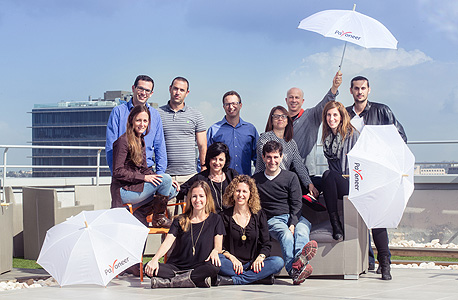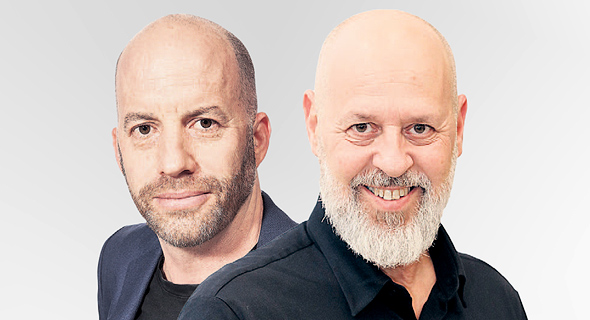Israeli tech workers are in for a billion shekel payday
Despite pandemic woes, several thousand veteran tech professionals are seeing nice earnings from secondary stock sales
It isn’t money coming from salaries or bonuses, just from selling stocks in so-called secondary deals — the sale of company stocks by previous shareholders. There is no point in dividing the number by 300,000, the number of tech workers employed in Israel, the beneficiaries are only the several thousand who were lucky enough to choose to work at companies that became more desirable to the big investors.
 Moon Active employees are some of those who made big bucks of secondary stock sales. Photo: Sharona Avraham
Moon Active employees are some of those who made big bucks of secondary stock sales. Photo: Sharona Avraham According to Dan Shamgar, a partner at the Meitar law firm, contrary to expectations and predictions that such deals would decrease during the Covid-19 outbreak, they actually ended up breaking all-time records. The pandemic may be rattling the entire world, but it also pushed the technological revolution years forward and with it the interest in Israeli unicorns.
An important tool for retaining talent
“2019 was a record year, with a billion dollars in secondary deals in Israeli companies, but this year, much to our surprise, there will be far more,” said Shamgar. “In the first half of the year alone, such deals amounted to $600-700 million. Based on the flow of deals and their volumes, it is clear to us that it will surpass $1 billion in total for the year. There simply aren’t any financing rounds beyond series C that don’t include the sale of shares by existing shareholders. Every round that is upwards of $50 million allows employees to sell their shares.”
 Dan Shamgar. Photo: PR
Dan Shamgar. Photo: PR The combined deals are estimated at a sum of $1.4 billion — but not all of that reaches the employees, only 20%, with the rest going to early-stage funds, Angels, and founders. The calculation is based on 20% of $1.4 billion, which is $280 million, or nearly a billion shekel.
Though there are no clear statistics about financing rounds in private companies and their internal breakdown, industry insiders say that on average between 15% and 20% of the capital goes to the employees. Deals of this sort are not uniform in structure — in some of them the funds that invested in very early stages sell portions or all of their shares, in others, it offers a chance for founders to “take a breath” and liquidate some of their holdings, but in most cases, the employees play a role as sellers. In most cases, it is the veteran employees, those who hold more significant shares of the company, who can come out of these rounds as millionaires. Since the inset of the Covid-19 crisis that pushed tech companies to cut salaries by double-digit rates, the option of selling shares has become a significant tool to retain talent.
Who are the happy winners? Nearly every financing round that was made public recently included an element of secondary stock sales. Even prior to the Covid-19 outbreak, the year began with an uproar over a giant secondary deal, worth hundreds of millions of dollars, involving Payoneer, whose employees and shareholders are estimated to have sold shares worth $200 million to private equity companies. A more recent example features gaming company Moon Active, in whose case the entire sum of $125 million dollars paid by Insight Partners went to the founders and employees who sold their shares. Another example is SimilarWeb, whose employees, mainly former employees sold shares for $100 million at the heart of the crisis and without raising a penny for the company itself.
 Payoneer's founding team in 2015. Photo: Tommy Harpaz
Payoneer's founding team in 2015. Photo: Tommy Harpaz The sellers are frequently the more veteran employees, whose options and naturally matures, following the customary four-year timeframe. Such people usually receive permission to sell between a quarter and a third of their holdings, according to agreements between management and the board of directors.
The employees are not forced to sell their shares and can instead choose to hold on to them in anticipation for the big exit, which may of course never happen. But there are other companies, who take a more democratic approach and offer all their employees a chance for a bonanza. “We recently completed a deal and the CEO told me that he didn’t close it to benefit the talents, but rather to help his personal assistant and the rest of the company employees who don’t necessarily make dream salaries as developers and let them enjoy the fruits of success,” Nir Linchevski, a managing partner at Israel Secondary Fund (ISF), which specializes in secondary deals, told Calcalist. ISF is currently investing its second $100 million fund, all of which is earmarked for the purchase of shares from funds, founders, and startup company employees.
 ISF's Nir Linchevski (left) and S-Cube's Gidi Shalom Bendor. Photo: Yossi Gamzu
ISF's Nir Linchevski (left) and S-Cube's Gidi Shalom Bendor. Photo: Yossi Gamzu Collecting unicorn stock
What is behind this clamoring for shares? The Covid-19 pandemic certainly played a role, but like everything else in 2020, it was the opposite of what was expected. “Many companies are experiencing incredible growth amid the outbreak and suddenly it is easier for investors to figure out the business model and the company’s full potential,” explained Shamgar. “The VCs still have lots of money and an appetite to invest, especially the big ones who don’t lead a round if it is for less than $50-$100 million. At the start, the appetites were even bigger since valuations became more attractive on one hand, while on the other, for the very same reason, companies may have not wanted to bring new money in to dilute the holdings of existing investors with lower valuations. The initial estimate back in March and April, that companies would just pump money in, never materialized. All of these factors nudge companies into secondary stock deals and we can witness investors taking advantage of the times to collect unicorn shares,” Shamgar said.
There is another surprising explanation, which was also not anticipated at the start of the crisis, and that is the near-complete disappearance of acquisition deals of over $500 million. “In recent months we have witnessed a sharp drop in acquisitions in the $400-$700 million range,” Shamgar explained, “Even the giants like Google and Apple who have the money are preoccupied with their internal affairs, adjusting resources to the new reality, which looks like is here to stay long beyond what was originally expected, and are less willing to grow through acquisitions. There is also the realization that integrating with a new company, which is always a difficult task, is nearly impossible without flights and face-to-face meetings between the buyers and sellers. Most of the acquisitions that have taken place in the last six months were the result of processes and negotiations that began before the outbreak. We estimate that this year will continue to be sparse in terms of mergers and acquisitions and result in a sharp decline in their numbers, ultimately it is the same issue that has led to lower valuations in the private market. The market has become an investors’ market.” Shamgar’s words resonate when you examine the exit figures on Israeli companies in the first half of 2020, as revealed in a study conducted by IVC and Meitar. The numbers show a six-year low in the number of deals — 52 in total, compared to 77 in the first half of 2019.
Nasdaq soars by 70%
Naturally, we can’t neglect what has been taking place on the Nasdaq in the last six months. There too, contrary to all predictions, records are being broken on a near-daily basis with investors flocking to tech stocks. Since hitting a low point in March, Nasdaq has climbed by more than 70% and though volatility returned in the last few weeks, and it has declined from its soaring peaks, it is still 245 points higher than it was at the start of the year.
 Qumra Capital's Boaz Dinte. Photo: Meir Cohen
Qumra Capital's Boaz Dinte. Photo: Meir Cohen The money flowing into VCs and private equity firms are ultimately derived from returns generated in the stock market. Therefore, the moment Nasdaq began recovering before reaching a peak of 12,000 points a month ago, the funds and their investors felt relief and started looking for investments again. “We constantly field requests from the big investment funds to sell them shares in our private companies. Those who failed to participate in the companies’ funding rounds are now looking for access to their shares through secondary stock,” Dinte said.
Until about five years ago secondary stock deals were not very popular because they were believed to signal a lack of faith in a company’s ability to reach the coveted exit. It was the deep transition that took place with the decline of interest rates to zero that flooded the market with money and made companies less enthusiastic about going public that also shifted the attitude to the sale of shares in private companies. The common perception in recent years is that it is permissible to hold a few pitstops in the race towards the big exit provided the amounts sold off are reasonable. “When it comes to the major $200-$300 million rounds, we are already dealing with substantial sales of founder and worker shares, it is important for me in such situations, to see that the founder is still with us and that his or her wealth is still determined by the company’s performance. If the founders and managers sell most of their holdings in secondary sales, I can tell our interests are no longer aligned,” Dinte concluded.



